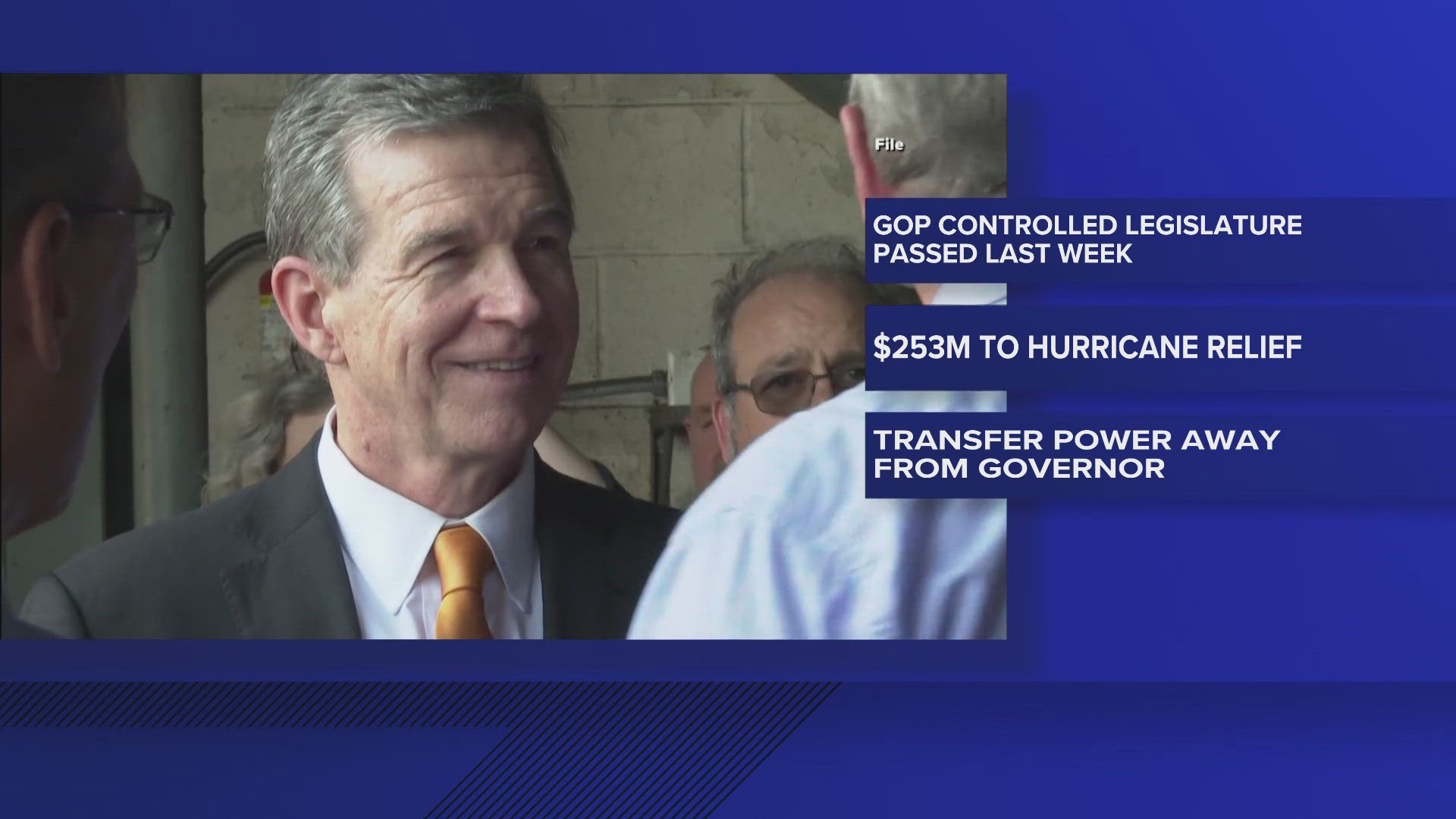CHARLOTTE, N.C. — North Carolina Gov. Roy Cooper has vetoed a state "disaster relief" bill because he says the "legislation is a sham."
Senate Bill 382 was passed last week by the Republican-controlled General Assembly. The bill contained $227 million in relief from the state's reserves but ordered the money to remain unspent for now. The bill also included provisions that would weaken the powers of the incoming governor, attorney general and state superintendent. In the recent election, those positions were all secured by Democrats.
With Republicans likely to lose their veto-proof majority in the next two-year legislative session, this session could be the last best chance for those lawmakers to enact laws containing sharp partisan changes.
The Republican attempt to erode Democrats' powers recalls similar measures passed in late 2016 that were designed to weaken Cooper, who was about to succeed Republican Gov. Pat McCrory. Those bills led to loud demonstrations in the Legislative Building and dozens of arrests.
The bill now returns to the General Assembly, where Republicans are expected to start their override attempt in Raleigh next week. They usually need all GOP House members and senators present and unified to be successful. But that could be challenging, as three House Republicans voted no on the bill this month. All three represent areas damaged by Helene's historic flooding. One of them said he voted against the measure because it was rushed through the General Assembly.
The vetoed bill did locate an additional $252 million for Helene relief, adding to the over $900 million that lawmakers had already set aside or started spending in previous measures this fall. But most of the money earmarked in the latest bill can’t be spent until the General Assembly acts again. Cooper asked the legislature last month to consider an initial Helene spending request of $3.9 billion.
The bill would have also sent $50 million to an ongoing program still trying to rebuild after Hurricane Matthew in 2016 and Hurricane Florence in 2018.
What was initially reported this fall as a $175 million shortfall for those ongoing housing projects grew to a request of more than $220 million. The money would go to the state’s Homeowner Recovery Program, which offers to “repair, rebuild, replace or elevate homes” of applicants affected by Matthew and Florence, according to ReBuild NC’s website.
Cooper established the office, also known as ReBuild NC, as a way to improve infrastructure in eastern North Carolina after it was hit by the two storms. The office has been plagued by criticism.
Laura Hogshead, who served as the office's chief operating officer for the North Carolina Office of Recovery and Resiliency since 2018, was no longer employed within the state's Department of Public Safety as of Wednesday, according to Janet Kelly-Scholle, the office's public information officer.
In an interview with WCNC Charlotte last week, Cooper signaled he was likely to veto this bill.
"This bill really didn't provide immediate and direct funding to western North Carolina," Cooper said at the time. "It simply moved some money around, saying that they were going to appropriate it later, that leaves small businesses hanging that are really in need of direct grants. It leaves local governments hanging and to bill this as a disaster recovery legislation, it's really a disaster in and of itself because it's just a massive power grab."
In that interview, Cooper estimated Helene's catastrophic impact at $53 billion. Helene was blamed for 103 deaths statewide. Cooper said he is seeking $25.5 billion in federal aid to rebuild critical infrastructure, including roads and bridges that were washed out, as well as public water systems that were knocked offline for weeks. During the interview, Cooper emphasized the need to build stronger, more resilient infrastructure ahead of future storms.
"These roads and bridges, and water systems and housing are going to have to be built back even stronger. That's going to be more expensive," Cooper said. "But we believe the investment is western North Carolina is worth it."
Cooper said he's met with President Joe Biden and numerous federal agencies and provided information to President-elect Donald Trump's team about the urgent need for relief in the mountains. He stressed that local governments cannot shoulder the load alone and called for a bipartisan approach to helping the region recover.
"We're hoping that they will make this a priority," Cooper said. "It's too important not to do this."
The Associated Press contributed to this report

